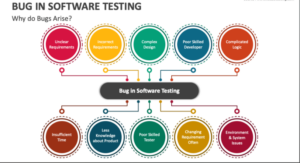We become lost when faced with a plethora of possibilities. When a market is saturated, everyone can locate the ideal tool. However, it invariably follows hours of laborious scrolling, reading, comparing, and looking at the screen.
We’ve put up a list of the top cross-browser testing tools that only provide the essential details, such as key features and limits, to save you time and sanity so you can concentrate on QA services. Examine each piece of software, and if something piques your interest, check out their official websites to learn more. You can also check out our QA training to learn more about other tools.
1.BrowserStack
You may try BrowserStack for free. It has a half-hour duration. For websites and web applications, cross-browser testing is available, with a time limit of one minute per device. In addition, 100 screenshots and response tests are included in the trial.
Features
- Test on over 3,000 actual browsers and gadgets.
- Test on Google, OnePlus, Motorola, Xiaomi, Huawei, and Samsung phones and tablets (running Android 4.4 to 13.0) as well as iPhones and iPads (iOS 3 to 16).
- Reach local development environments.
- Specially designed for teams.
- Visual testing across browsers that includes comments, notifications, and team access.
- Selenium cross-browser testing makes web apps work and look the same no matter what browser is used to access them.
- Testing across browsers with WebdriverIO.
Limitations
- There have been complaints from certain users regarding the tool’s speed.
- Testing complicated web apps might not be a good use for this particular technology.
- Time-out restrictions that are not customizable.
2.BitBar
BitBar provides a free 14-day trial.
Features
- Enables testing of apps on the newest and most widely used real browsers and devices.
- Offers parallel execution right out of the box, which can expedite the testing process.
- Accommodates both Robotium and Appium.
- Provides integrations with Zephyr, Gradle, Jenkins, Slack, AlertSite, and many other platforms.
- Allows you to test an application’s performance in a variety of situations by simulating network conditions, such as varying latency and bandwidth. This allows you to recreate real-world scenarios.
- Allows you to compare screenshots taken with various browsers and devices in order to spot any visual discrepancies or problems with layout that might be caused by rendering differences.
Limitations
- Web applications are not the tool’s primary purpose; testing native mobile apps is.
- Occasionally, UI bugs.
- Dependencies may cause problems.
3.Virtuoso
Virtuoso offers a 14-day free trial.
Features
- Automates end-to-end (E2E) testing on any device, operating system, or browser by using artificial intelligence.
- Enables the creation of functional tests using NLP, integrated API testing, and visual regression testing to achieve full, codeless, E2E test coverage.
- Offers a scalable solution that helps the team grow while satisfying testing requirements.
- Supports a variety of browsers, including Internet Explorer, Firefox, Google Chrome, Safari, and Opera, in their various versions.
- Allows for parallel processing.
Limitations
- An adjustment period.
- Not being able to design user journeys, share checkpoints across goals, or have preset extensions are examples of a lack of customisation.
- Could do with a little UI and reporting improvements.
4.TestGrid
One user can use TestGrid’s 200-minute/month freemium subscription.
Features
- Provides codeless and AI-driven cross-browser testing, enabling you to run tests across more than 1000 actual operating systems and browser combinations.
- Offers an integrated cross-browser testing solution that makes it possible to test how a website looks across several browsers.
- Provides automation features that let you automate the process of testing across browsers.
- Provides an extensive cross-browser testing guide that will assist you in comprehending all capabilities and determining which browsers are best for your testing requirements through analysis.
Limitations
- It could require some time to troubleshoot.
- There is room for improvement in the auto-heal feature.
- A few UI tweaks would improve the usability.
5.Browsershots
A cross-browser testing tool that is infinitely free is called Browsershots.
Features
- The gadget is simple and lightweight.
- It’s freely available.
- Lets you view how a website appears in diverse situations by giving you the option to test it on multiple operating systems.
- Reduces the need for manual testing by automating the process of taking screenshots across many browsers and operating systems.
- To view how the website functions on a mobile device, you can reduce the screen size.
- To tailor the testing parameters to your requirements, you can select particular browsers, versions, screen resolutions, colour depths, and other configurations.
Limitations
- Displays static screenshots and lacks the ability to test features such as AJAX queries, dynamic content, and form submissions, as well as to interact with the website.
- Mainly concentrates on taking screenshots, which might not be enough for comprehensively testing intricate web programs that need interaction and functionality confirmation.
- The backlog of unfulfilled requests may cause delays in the delivery of screenshots, contingent on the level of demand for the service.
- Compared to some contemporary cross-browser testing platforms, it could not support the most recent browser versions or offer a large selection of browser options.
- Browsershots does not offer real-time testing or immediate feedback on how a website functions because it just creates screenshots.
- There’s a chance that the tool’s server resources are constrained, which would cause processing speeds to lag during high usage.
6.Selenium
Yet another free tool is selenium. However, there are additional service and infrastructure fees.
Features
- An open-source program that makes web browsers automatic.
- Selenium’s cross-browser testing makes web app testing quick and dependable.
- Enables you to develop test scripts in the preferred programming languages using a single interface.
- Enables the automated testing of web apps across many platforms and browsers by developers and QA experts.
- Gives users access to a real mobile device and more than 3000 desktop browsers on the Cloud Selenium Grid.
Limitations
- Need knowledge of programming.
- Setting up and configuring the tool could take some time.
For customers who are not technical or who would rather use a codeless testing method, this might not be the ideal option.
Conclusion
You can learn more about Cross-Browser testing tools that you can use by checking our Quality assurance training online.





























